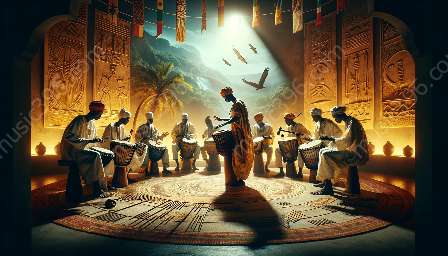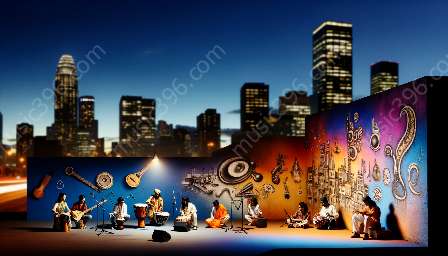Afro-Caribbean music reflects the rich cultural and historical heritage of the Caribbean, combining elements of African and Caribbean musical traditions. These diverse genres, studied through the lens of ethnomusicology, showcase unique characteristics that have contributed to their global influence.
Influence of Afro-Caribbean Traditions
Afro-Caribbean music is rooted in the fusion of African rhythms, melodies, and instrumentation with Caribbean influences. This fusion resulted from the transatlantic slave trade, which brought African music traditions to the Caribbean, where they merged with indigenous Caribbean music forms. This blending produced a range of unique musical genres, each with its own distinct characteristics.
Diversity of Rhythms and Percussion
One of the defining characteristics of Afro-Caribbean music genres is the diversity of rhythms and percussion instruments. The intricate polyrhythmic patterns, often performed on instruments such as congas, bongos, and tamboras, create a mesmerizing and energetic groove that is central to Afro-Caribbean music. These rhythms are often derived from traditional African drumming and have been adapted and integrated into various Afro-Caribbean genres.
Melodic Complexity and Call-and-Response
Afro-Caribbean music is known for its melodic complexity, characterized by intertwining melodies and intricate harmonies. Moreover, the call-and-response singing technique, derived from African musical traditions, is a fundamental aspect of many Afro-Caribbean genres. It fosters interaction and communal participation, creating a vibrant musical dialogue between vocalists and audiences.
Danceable Grooves and Infectious Beats
Another prominent feature of Afro-Caribbean music is its danceable grooves and infectious beats. The syncopated rhythms and pulsating bass lines of genres like reggae, salsa, and calypso have gained worldwide acclaim for their ability to inspire movement and energize audiences. These grooves serve as a unifying force, bringing people together through the universal language of rhythm and dance.
Storytelling and Cultural Expression
Afro-Caribbean music often serves as a platform for storytelling and cultural expression. Through lyrics, instrumentation, and dance, artists convey narratives of historical struggles, social issues, and cultural celebrations. This function of music as a vehicle for cultural preservation and expression is essential to understanding the significance of Afro-Caribbean music within its cultural context.
Ritual and Spiritual Significance
Many Afro-Caribbean music genres are deeply intertwined with ritual and spiritual practices. From the ceremonial drumming of Haitian Vodou to the religious music of Santería, Afro-Caribbean musical traditions are integral to spiritual ceremonies and communal rituals. This connection between music and spirituality reinforces the cultural and religious identities of Afro-Caribbean communities.
Global Impact and Influence
Afro-Caribbean music genres have made a significant impact on global music. From the pioneering sounds of Afro-Cuban jazz and the infectious grooves of reggaeton to the vibrant melodies of zouk and the powerful social commentary of calypso, these genres have captivated audiences worldwide. Their influence has transcended geographical boundaries, contributing to the rich tapestry of world music.
Conclusion
The characteristics of Afro-Caribbean music genres are a testament to the resilience, creativity, and cultural richness of Afro-Caribbean communities. Through their diverse rhythms, melodic intricacies, and cultural significance, these genres continue to shape the musical landscape and stand as a celebration of cultural heritage and global interconnectedness.



































